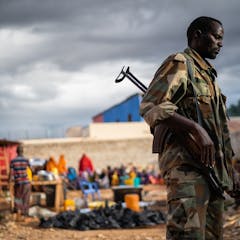
Articles on Health
Displaying 1621 - 1640 of 2517 articles

Cutting down on alcohol consumption before pregnancy can benefit the health of both men, women and their baby.

Screen time overload? Here’s how to regain control and boost your health.

A new study has attempted to quantify the pandemic’s effects on global health by surveying people across 13 countries.

Access to swimming in the UK has been hit by COVID and the cost of living crisis and that has consequences for children and young people.

A sociologist interviewed dozens of middle-class Black singles about their friendships, freedom and dating lives.

After decades of effort to reduce discrimination in the workplace, a cultural change may be happening that will enable people to move past their unconscious biases.

Some commercial products and practices are directly linked to avoidable ill health, planetary damage, and social and health inequity. Large transnational corporations are especially to blame.

Neglected tropical diseases of the skin are stigmatised, and may affect an individual’s quality of life

The drinking water systems serving over 70 million people may not meet newly proposed water quality standards. It could cost hundreds of billions of dollars to fix that.

Rates of cardiac arrest are high. So, why don’t more people know CPR?

Transportation Secretary Pete Buttigieg is looking into new rules for trains. Trucks, however, are involved in thousands more hazmat incidents every year in the US.

Three quarters of Australians are living with HSV-1, with cold sores tending to appear at the most inconvenient times.

Vinyl chloride dilutes fairly quickly in outside air and water. One concern for lingering exposure from the derailment involves private wells.

If you want to use an exoskeleton to improve balance, a study finds that superhuman reflexes can help you stay upright.

Yes, there are forever chemicals in biosolids we use on farms. Here’s why we don’t need to panic … yet

The negative effects of conflict on human capital – particularly nutrition, health and education – are larger than commonly thought.

Medicine works better when the treatments are tailored to fit each individual person’s biology and history. A first step is increasing diversity in clinical trials, but the end goal is precision medicine.

New Zealand’s health system has been plagued by short-term thinking for decades. The latest reforms need to address key issues if the government wants to future proof our key health services.

The demand for donkey hides to produce ejiao has led to a shortage of donkeys in China and increasingly worldwide.

After nearly 40 years of effort, Guinea worm disease is on the cusp of being the second human disease – after smallpox – to be eradicated on Earth.

